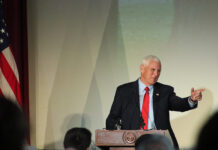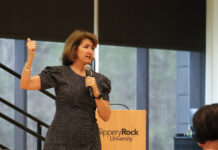Slippery Rock University’s increased use of online courses has sparked debate from members of the university.
SRU Communication professor Dr. James Laux explained that he thinks distance education can work for certain classes, but not others.
“I think there are subject matter which is well-suited for an online format if it is being presented effectively,” Laux said. “It’s contingent on the skills of the instructor. Given someone who is skilled working in that format and the motivation and mentality of the learner, then it can work especially with the right subject matter.”
“I think that given our current technology, you just can’t get the same level of instruction [in some courses],” Laux said. “A notable example of that from my standpoint would be Public Speaking. I honestly believe that in no way shape or form that you can have the same qualitative experience in a public speaking class online.
Laux stated that he could make a lot of money by teaching Public Speaking online over the summer and winter semesters but he refuses to because he personally thinks that students do not gain the experience that they should be getting from the class.
According to Laux, some online public speaking classes require 10 audience members to be present during the recording of a speech, but there is no standard requirement for an audience between different public speaking classes. Laux stated that even with the potential viewer requirement, it is still not the same experience as speaking in front of a class.
“I don’t think that me lining up 10 of my inebriated friends in my residence hall or apartment constitutes an audience in the same sense that it does in a classroom situation,” Laux said. “The immediacy and type of feedback that’s available to be given are not equal.”
Laux did not believe that standardization was the means that could improve online classes.
“Some of this is polishing off the edges when it is fundamentally flawed,” Laux said. “There’s no sense in polishing up a diamond that has significant flaws because when you get done with your effort you have a flawed diamond. That to me is like the 10 person requirement. It’s that the whole model is flawed.”
Brian Danielson, director of SRU’s Center for Excellence in Teaching and Educational Technology, argued that Public Speaking is an effective online course.
“If a teacher is excited about teaching and you have students that want to learn, I don’t care what the modality is, it will happen,” Danielson explained. “So, I absolutely think that public speaking can happen online. One of the requirements of public speaking is that you have to speak in front of a crowd.”
“Distance education is perfect for that, because you’re out in the world. You’ve got your church, you’ve got your rotary club, and you’ve got the whole world as your audience. Just go find a place to do it as opposed to a bunch of students that have to be there. It’s even better.”
According to Danielson, preventing cheating is one of the greatest challenges for distance education, but it is not impossible.
“There’s a couple ways you can [prevent cheating],” Danielson said. “You can tweak your assessments in a way that prevents cheating. If you have writing assignments, you can use Turnitin which detects plagiarism. If it is a test, you can randomize questions which gives you a different set questions in a different order. You can add a timer to the test.”
Another possibility is that the students could purchase 3D cameras that could record the room as the student takes an exam which would allow the professors to see all conditions of the room while the student takes a test. Danielson said that he hopes that students will not have to be required to use 3D cameras.
Laux stated that it’s obvious that students cheat on online exams, and that reorganizing questions and creating timers does little to prevent students from cheating.
“An examination is supposed to measure what an individual knows about a specific body of knowledge at some given point in time,” Laux said. “If it doesn’t access that, it’s not valid. The measurement is worthless. I think we’re getting a lot a worthless measurements. Except it’s worse than nothing because it pretends to be something.”
Danielson explained that maybe the idea of tests should be changed altogether.
“The less popular, but I would think, more pedagogically sound approach to the problem is to change the way that you test and assess your student,” Danielson said. “The test is no longer a tool that used to catch a student not knowing information but use the test as retention tool.”
Danielson explained that normally if a student flunks a test, then the information never comes up again and the student won’t be motivated to go back and learn the material.
“Some would say, why not give the test and tell them that its open book and that they can use retake it as much as they want and they can use their friends because in real life when you work together it’s call collaboration, but in higher education, it’s called cheating,” Danielson said. “Yeah, they’re working together, but they read the material, and when they come to class everyone has the same proficiency levels.”
Alternatively, Danielson believes that online classes could rely more on projects and essays than exams.
Laux stated that the reasoning behind having online classes is wrong to begin with.
“I think that there’s a simple explanation for the proliferation of online classes, and it’s not education. “It’s money. Why do people take the classes? For convenience.”
“I’ve heard now that the president of the university has at least said on at least three occasions that students have told us how they want to learn and that is online,” Laux said. “Without disrespecting students, students can tell you all kinds of things about how they would prefer to learn but not all of them are in their long-term best interest. Our students have told us that most of them also don’t want to be bothered with taking a foreign language. They are wrongheaded about that and we should tell them that, not acquiesce to them.”
“Students of any age are going to be are going to be sort of inherently motivated in many instances by what’s easiest, what’s most convenient, and what’s the straightest line between two points. It’s the job of the faculty to a great extent to educate them as to why they should want something different.”
Danielson said there is a greater need for online courses beyond financial benefits.
“Enrollments are down because there are less students graduating from high school in the surrounding counties,” Danielson said. “So what we need to do is to broaden our student base. Who do we serve? It used to be just residential students trying to get an undergraduate degree but there are a lot of adult non-traditional learners that could benefit from getting a degree.”
Even with SRU’s increased interest in online classes, Danielson does not think that traditional classes will be completely replaced.
“I don’t think there is any desire to replace the four-year residential undergraduate experience, Danielson said. “No way. That is where we are. But at the same time we have an opportunity to better serve the commonwealth with our technology.”








It’s hard to argue with Dr. Laux on this one
It’s hard to argue with Dr. Laux on this one